Daily Vocabulary Words: List of Daily Used Words in Leading Indian Newspapers
Hi there. Welcome to this special section @ Wordpandit. Our endeavour here is straightforward: highlighting daily vocabulary words that you would come across in leading newspapers in the country. We have included the following newspapers in our selection:
• The Times of India
• The Economic Times
• Hindustan Times
• Mint
• Indian Express
We are putting in extensive work to develop your vocabulary. All you have to do is be regular with this section and check out this post daily. This is your repository of commonly used words; essentially, we are posting a list of daily used words. Hence, this has significant practical application as it teaches you words that are commonly used in leading publications mentioned above.
Visit the website daily to learn words from leading Indian newspapers.
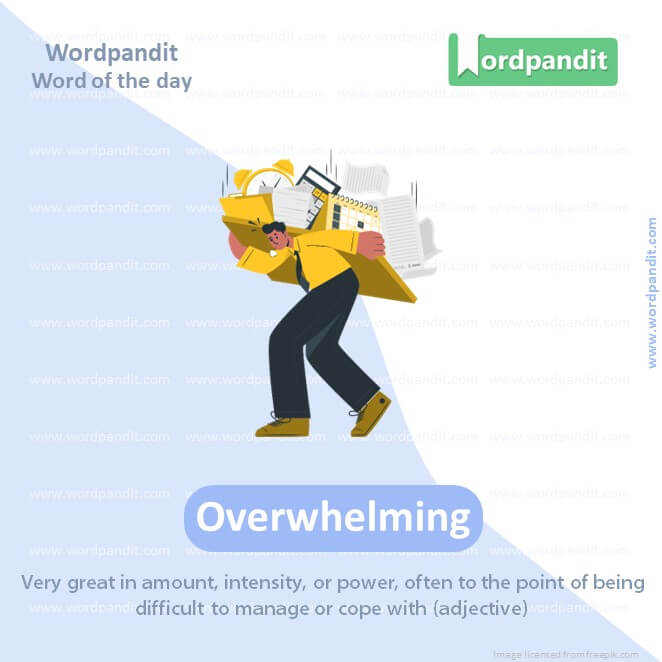
WORD-1: Overwhelming
CONTEXT: Sexual harassment cases are hard to pursue everywhere precisely because many investigation and justice systems see everything from the point of view of the accused, whose social or financial power is overwhelming.
SOURCE: Times of India
EXPLANATORY PARAGRAPH: Imagine if you had so many toys to play with that you couldn’t decide which one to pick. That’s what “overwhelming” means—it’s when something is so big, strong, or impressive that it’s hard to handle or manage.
MEANING: Very great in amount, intensity, or power, often to the point of being
difficult to manage or cope with (adjective).
PRONUNCIATION: oh-ver-WEL-ming
SYNONYMS: overpowering, immense, massive, tremendous, crushing
USAGE EXAMPLES:
1. The support from the community was overwhelming during the crisis.
2. The beauty of the landscape was overwhelming.
3. She felt overwhelmed by the amount of work to be done.
4. The applause was overwhelming after his performance.
WORD-2: Fantastical
CONTEXT: Their fears were based on the fantastical notion that AGI is imminent and could prove to be an existential threat.
SOURCE: Indian Express
EXPLANATORY PARAGRAPH: Imagine if you could visit a magical kingdom with talking animals and flying dragons. That’s what “fantastical” means—it’s when something is imaginative, strange, or imaginary, like in a fairy tale or a fantasy story.
MEANING: Existing only in the imagination; fanciful, whimsical, or surreal (adjective).
PRONUNCIATION: fan-TAS-ti-kuhl
SYNONYMS: imaginative, whimsical, surreal, fanciful, bizarre
USAGE EXAMPLES:
1. The novel was filled with fantastical creatures and magical lands.
2. Her paintings often depicted fantastical scenes inspired by dreams.
3. The play had a fantastical storyline that captivated the audience.
4. The artist’s work was known for its fantastical elements and vibrant colors.
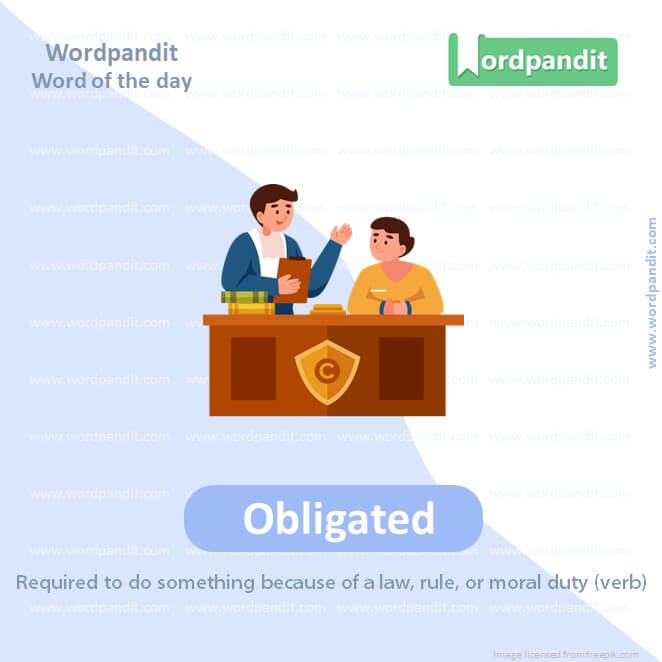
WORD-3: Obligated
CONTEXT: Are business owners morally obligated to provide customers fair access to essential items in times of crises and a resultant desperate need or seize the opportunity to hike prices?
SOURCE: Hindustan Times
EXPLANATORY PARAGRAPH: Imagine if you promised your friend that you would help them with their homework, and you felt like you had to do it because you said you would. That’s what “obligated” means—it’s when you feel like you must do something because you promised, or because it’s your duty or responsibility.
MEANING: Required to do something because of a law, rule, or moral duty (verb).
PRONUNCIATION: OH-bli-gey-tid
SYNONYMS: required, compelled, duty-bound, bound, responsible
USAGE EXAMPLES:
1. As a parent, she felt obligated to provide for her children.
2. Employees are obligated to follow company policies and procedures.
3. He felt obligated to attend the meeting even though he was busy.
4. Students are obligated to complete their assignments on time.
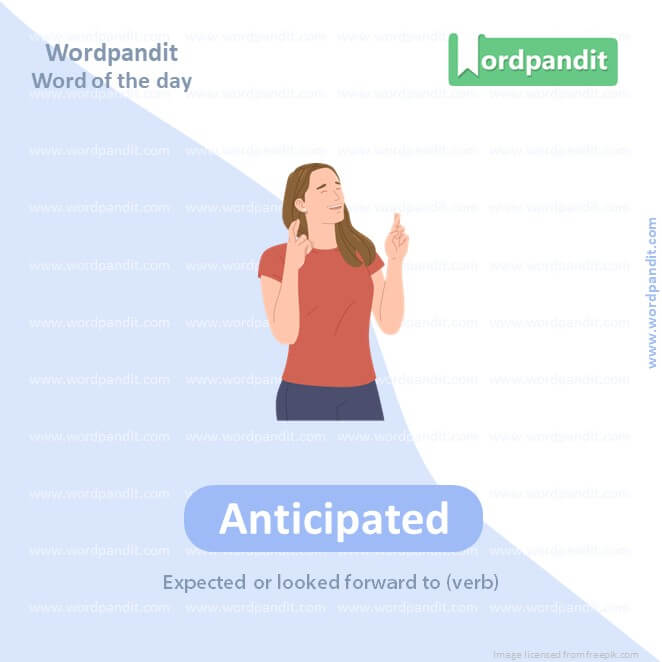
WORD-4: Anticipated
CONTEXT: There was no major economic accident and the world performed better in 2023 than what was anticipated.
SOURCE: Times of India
EXPLANATORY PARAGRAPH: Imagine if you were waiting for your favorite movie to come out and you were really excited about it. That’s what “anticipated” means—it’s when you expect or look forward to something happening, like an event or an experience.
MEANING: Expected or looked forward to (verb).
PRONUNCIATION: an-TIS-uh-pey-tid
SYNONYMS: expected, awaited, predicted, awaited
USAGE EXAMPLES:
1. The anticipated sequel to the movie was finally released.
2. The anticipated arrival of guests made her prepare a special meal.
3. The anticipated sale attracted a large crowd to the store.
4. His anticipated promotion brought a sense of accomplishment.
WORD-5: Imminent
CONTEXT: Their fears were based on the fantastical notion that AGI is imminent and could prove to be an existential threat.
SOURCE: Indian Express
EXPLANATORY PARAGRAPH: Imagine if you were playing outside, and suddenly you saw dark clouds and heard thunder, which meant a storm was about to happen. That’s what “imminent” means—it’s when something is about to happen very soon, like it’s just around the corner.
MEANING: About to happen; impending or forthcoming (adjective).
PRONUNCIATION: IM-uh-nuhnt
SYNONYMS: impending, forthcoming, looming, approaching, close
USAGE EXAMPLES:
1. The imminent deadline forced him to work late into the night.
2. The doctors warned of the imminent arrival of a severe storm.
3. She felt the imminent danger and quickly took cover.
4. The company announced the imminent launch of its new product.
WORD-6: Corollary
CONTEXT: This ethics versus opportunity is a vexed debate often resting in favour of “opportunity” as the logical corollary of a market-driven economy.
SOURCE: Hindustan times
EXPLANATORY PARAGRAPH: Imagine if you had a big math problem, and once you solved it, you found another problem that was directly related to the first one. That’s what a “corollary” is—it’s a conclusion or result that naturally follows from something else.
MEANING: A proposition that follows naturally from another, often as a result or consequence (noun).
PRONUNCIATION: KOR-uh-lair-ee
SYNONYMS: consequence, result, outcome, implication, effect
USAGE EXAMPLES:
1. The corollary of increased demand was higher prices for the product.
2. One corollary of technological advancement is increased productivity.
3. The study found a corollary between diet and overall health.
4. The corollary to her argument strengthened her position.
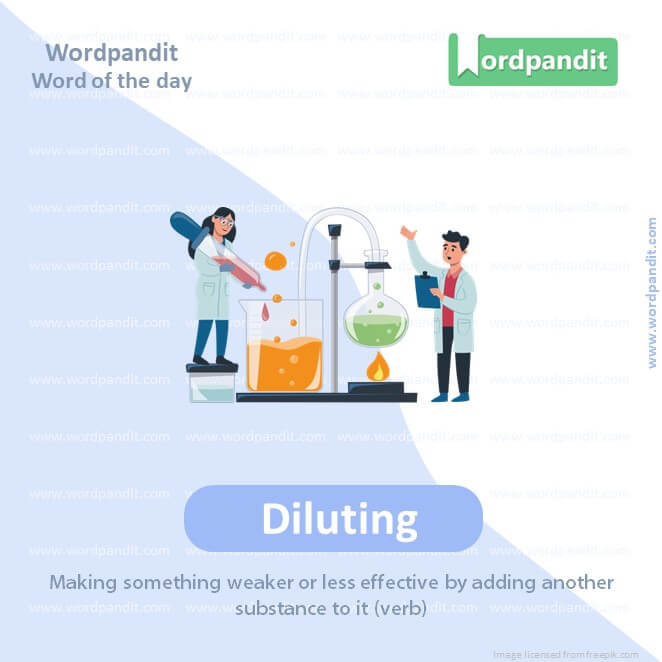
WORD-7: Diluting
CONTEXT: What the letter ignored was the political economy around AI — the question of data hunger of AI which has implications on both diluting privacy and on labour conditions of platform workers.
SOURCE: Indian express
EXPLANATORY PARAGRAPH: Imagine if you had a glass of juice, and you added a lot of water to it, so the juice became less strong or less flavorful. That’s what “diluting” means—it’s when you make something weaker or less concentrated by adding another substance, usually a liquid.
MEANING: Making something weaker or less effective by adding another
substance to it (verb).
PRONUNCIATION: DI-loo-ting
SYNONYMS: weakening, thinning, watering down, attenuating, reducing
USAGE EXAMPLES:
1. Adding more water to the paint was diluting its color intensity.
2. Diluting the solution made it less acidic and more tolerable.
3. He felt that including too many ideas was diluting the impact of the presentation.
4. The compromise ended up diluting the original proposal’s strength.
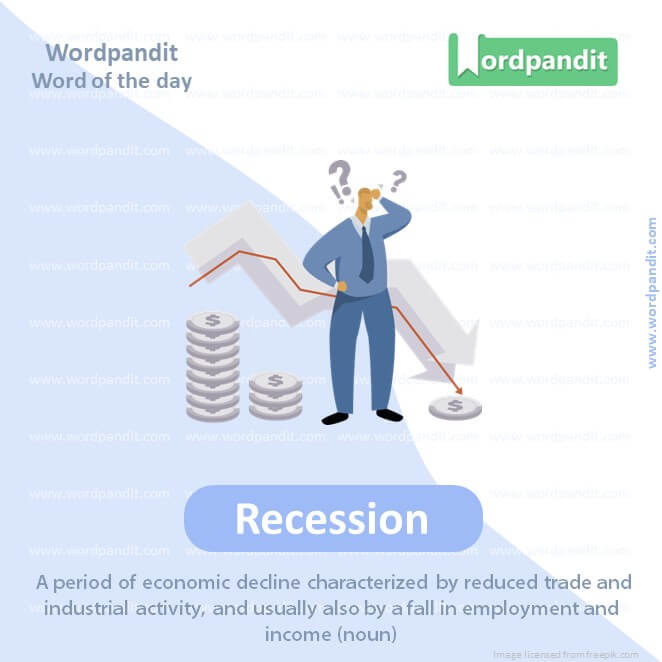
WORD-8: Recession
CONTEXT: The world’s largest economy, America, avoided a recession and is projected to grow a robust 2.5% in 2023. China, the second-largest economy, saw its GDP rebound as Covid curbs were lifted and the government provided huge support.
SOURCE: Times of india
EXPLANATORY PARAGRAPH: Imagine if suddenly there were fewer customers at your family’s store, and you had to be careful with spending money. That’s what a “recession” is—it’s when the economy slows down, businesses make less money, and people are more cautious about spending.
MEANING: A period of economic decline characterized by reduced trade and
industrial activity, and usually also by a fall in employment and income (noun).
PRONUNCIATION: ri-SESH-uhn
SYNONYMS: economic downturn, slump, depression, decline, downturn
USAGE EXAMPLES:
1. The recession led to layoffs in many industries.
2. Consumers tightened their budgets during the recession.
3. The government implemented measures to address the effects of the recession.
4. Businesses struggled to survive during the economic recession.
WORD-9: Mystical
CONTEXT: the concrete harms of AI systems, which are becoming ubiquitous, were ignored in favour of an industry-centric worldview in which the “danger of AI” was in a mystical future variant of the technology.
SOURCE: Indian express
EXPLANATORY PARAGRAPH: Imagine if you heard stories about magical creatures like unicorns or fairies living in a hidden forest. That’s what “mystical” means—it’s related to magic, mystery, or spirituality that seems beyond ordinary understanding.
MEANING: Relating to magic, mystery, or spirituality that is beyond ordinary understanding (adjective).
PRONUNCIATION: MIS-ti-kuhl
SYNONYMS: magical, otherworldly, spiritual, enchanted, mysterious
USAGE EXAMPLES:
1. The ancient temple held mystical powers according to local legends.
2. She felt a mystical connection to nature during her meditation.
3. His paintings often depicted mystical landscapes and creatures.
4. The mystical rituals were believed to bring prosperity to the village.
WORD-10: Stochasticity
CONTEXT: It ignored AI’s stochastic and opaque workings which have impacts on democratic processes when AI systems are used in public-use cases like surveillance and policing (where stochasticity and arbitrariness shouldn’t be tolerated) as well as ignoring the propensity of AI systems in replicating and strengthening structural problems.
SOURCE: Indian express
EXPLANATORY PARAGRAPH: Imagine if you were playing a game with dice, and you couldn’t predict what numbers would come up. That’s what “stochasticity” means—it’s the quality of being random or unpredictable, like the outcome of a random event.
MEANING: The quality of being random or unpredictable, especially in a statistical context (noun).
PRONUNCIATION: stuh-KAS-tuh-si-tee
SYNONYMS: randomness, unpredictability, variability, chance, uncertainty
USAGE EXAMPLES:
1. The results of the experiment showed a high level of stochasticity.
2. Stochasticity in weather patterns makes long-term predictions challenging.
3. The stock market’s stochasticity can lead to unexpected fluctuations.
4. Understanding the stochasticity of gene expression is vital in biology.
Vocabulary SSC
Navigating the path to success in competitive examinations like the Staff Selection Commission (SSC) triggers a keen focus on ‘vocabulary SSC’. This collection of words, often prominent in SSC examinations, holds paramount importance, and forms a significant part of a candidate’s linguistic preparation. However, mastering ‘vocabulary SSC’ is a process that requires deliberate strategy and dedication.
To begin the journey with ‘vocabulary SSC’, a structured learning regime is key. Break the learning process into manageable chunks. Concentrate on a set number of words each day. This steady, consistent approach reduces the risk of burnout and enhances long-term retention of vocabulary.
The strategic use of memory aids can significantly boost the learning of ‘vocabulary SSC’. Utilize flashcards, memory apps, or even create personal mnemonics to help remember each word and its meaning more effectively. Associating a word to a personal event or object creates a lasting mental connection, making recall easier.
To truly master ‘vocabulary SSC’, it’s crucial to engage with the words in different contexts. Incorporating the words into daily reading and writing practices provides exposure to their usage in varied situations. This practical application reinforces the understanding of ‘vocabulary SSC’, enhancing the ability to employ these words accurately in the exam setting.
Regular revision is a must when preparing ‘vocabulary SSC’. Spaced repetition, interspersing the study with regular breaks, and regularly revisiting the words learned, ensures the words stay firm in your memory, ready to use when needed.
In essence, preparing ‘vocabulary SSC’ is an exercise in action-oriented constant learning. Strategic use of learning tools, practical application, and regular revision are key aspects of getting a grip on ‘vocabulary SSC’. As you stride through this process, you inch closer to acing your SSC examinations with an enriched vocabulary and boosted confidence.







